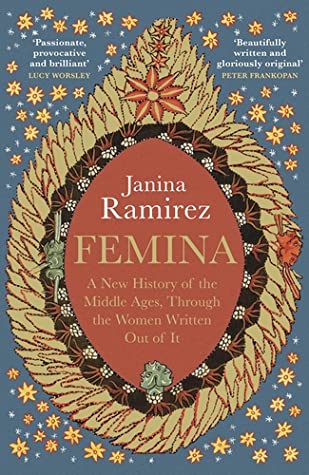Femina is subtitled, A New History of the Middle Ages, Through the Women Written Out of It. Says it all, really. Thanks to Netgalley and the publishers, I got a late ARC for the book (plus an update with good pictures). It was published on 21st July and I started reading it about a week later.

Femina: A New History of the Middle Ages, Through the Women Written Out of It
by Janina Ramirez
“I am the fiery life of divine substance, I blaze above the beauty of the fields, I shine in the waters, I burn in sun, moon and stars” – Hildegard of Bingen (1098 – 1179)
The middle ages are seen as a bloodthirsty time of Vikings, saints and kings: a patriarchal society which oppressed and excluded women. But when we dig a little deeper into the truth, we can see that the ‘dark’ ages were anything but.
Oxford and BBC historian Janina Ramirez has uncovered countless influential women’s names struck out of historical records, with the word FEMINA annotated beside them. As gatekeepers of the past ordered books to be burnt, artworks to be destroyed, and new versions of myths, legends and historical documents to be produced, our view of history has been manipulated.
Only now, through a careful examination of the artefacts, writings and possessions they left behind, are the influential and multifaceted lives of women emerging. Femina goes beyond the official records to uncover the true impact of women like Jadwiga, the only female King in Europe, Margery Kempe, who exploited her image and story to ensure her notoriety, and the Loftus Princess, whose existence gives us clues about the beginnings of Christianity in England. See the medieval world with fresh eyes and discover why these remarkable women were removed from our collective memories. (goodreads)
My Review
This is one of those books you read carefully, all the way through, or dip into when you feel ready for the next character. I read it carefully, since I felt a duty to do so, although at several points I was tempted to skim. And maybe it would be best to skim some of the great detail Ramirez goes into, especially when it involves the male politicians (and religious political manoeuvrings).
It is also very easy for me to view the Middle Ages with fresh eyes, since my previous encounters with it have all been through relatively recent books. I am not a historian. This book drew me because of the promise of women kicking against the establishment. And yes, I found them. But more, I found how much of our reason for needing female role models is mostly relatively recent. The Reformation certainly didn’t help, and started the exclusion of women’s writing. But the Victorians are probably most to blame for what we are currently still kicking against, despite the fact we’ve been doing it since at least World War 2 ended. Femina puts all this into perspective, and opens our eyes to what the women of the past went through to assert their rights.
It is not surprising most of the tales of extraordinary women who should be remembered better are a privileged few. Queens, consorts, abbesses and the occasional female king (Jadwiga), were better placed to get their voices heard. And they did, before they were buried by those who came after.
The best parts of this book were, to my mind, the start of each chapter where the author describes how the subject was rediscovered through painstaking research and archaeology, and sometimes through adventures worthy of a spy novel. The pattern of the book then takes us to era of the woman in question, exploring her life and work. This can get somewhat turgid: the author explains the setting and background politics in great detail. I suspect that historians won’t need that, and lay folk will sometimes get bored with it (hence the skimming temptation). But the author does return to the subject and her triumphs, or downfall, and how we should perhaps remember her, in a good summary each time.
This is a valuable book for all sorts of reasons, not least the attention to detail given to women whose work has been all but buried with them thanks to the political whim of later historians. It’s a tour de force, as you can tell from the pages of acknowledgements and the endnotes. If you are reading on Kindle, rest assured that 27% of the book is taken up by the reference material. It’s 5 stars for importance and 4 stars for a good read, in my assessment. And now I’m quite a fan of Hildegard, and the Cathars. I think I’d have joined the heretics if I’d lived then.
Book Review | Femina: A New History of the Middle Ages, Through the Women Written Out of It by Janina Ramirez 'a tour de force – now I'm a fan of the Cathars, and Hildegard' #history #non-fiction #feminism #Femina #netgalley… Click To Tweet

I love the cover! It’s got a beautiful pastel theme going on. Lovely Review as usual Jemima 😀 I’m highly intrigued.
Thanks for bringing this to my attention. Long ago in another life the Middle Ages were my specialty (was my specialty?). I know many of the names you mention, have read some of their work, with a strong bias to Britain, and really want to see what the author has to say!